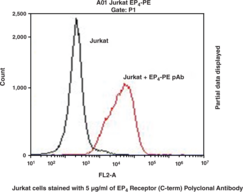Territorial Availability: Available through Bertin Technologies only in France
- Correlated keywords
- PGE2 receptors antibody antisera antibodies flow cytometry immunocytochemistry FC IF FACS immunoblotting 4 Anti-EP4 Receptor (C-Term):SureLight® R-PE 16687 PGE EP PTGER antiinflammatory Anti-body over-expressed TNF? G?
- Product Overview:
Prostaglandin E2 (PGE2) binds to four receptor subtypes: EP1, EP2, EP3, and EP4, which are all membrane-bound G protein-coupled receptors (GPCRs).{9114,6742,57668} The EP4 receptor was originally classified as the EP2 receptor but was not activated by the EP2 agonist butaprost (Item Nos. 13740 | 13741) and was later found to be a distinct receptor with sequence differences.{2035,3178} It is expressed in many tissues, including the intestine, heart, kidney, lungs, and brain, and is also expressed in peripheral blood leukocytes and macrophages.{57668} The EP4 receptor is coupled to G?s, and its activation increases intracellular cAMP levels, leading to tissue-specific effects. It induces smooth muscle relaxation, angiogenesis, T cell expansion, osteoblast differentiation, and bone resorption and inhibits TNF-? production in monocytes and macrophages, among other activities. PTGER4, the gene encoding the EP4 receptor, is overexpressed in a variety of cancers, and antagonism of the receptor in animal models inhibits tumor growth and angiogenesis.{57669} In contrast, EP4 receptor activation has anti-inflammatory and neuroprotective activities in vitro and in animal models.{57670,57671} Cayman’s EP4 Receptor (C-Term) Polyclonal PE Antibody can be used for flow cytometry (FC) and immunofluorescence (IF) applications.
Cayman Chemical’s mission is to help make research possible by supplying scientists worldwide with the basic research tools necessary for advancing human and animal health. Our utmost commitment to healthcare researchers is to offer the highest quality products with an affordable pricing policy.
Our scientists are experts in the synthesis, purification, and characterization of biochemicals ranging from small drug-like heterocycles to complex biolipids, fatty acids, and many others. We are also highly skilled in all aspects of assay and antibody development, protein expression, crystallization, and structure determination.
Over the past thirty years, Cayman developed a deep knowledge base in lipid biochemistry, including research involving the arachidonic acid cascade, inositol phosphates, and cannabinoids. This knowledge enabled the production of reagents of exceptional quality for cancer, oxidative injury, epigenetics, neuroscience, inflammation, metabolism, and many additional lines of research.
Our organic and analytical chemists specialize in the rapid development of manufacturing processes and analytical methods to carry out clinical and commercial GMP-API production. Pre-clinical drug discovery efforts are currently underway in the areas of bone restoration and repair, muscular dystrophy, oncology, and inflammation. A separate group of Ph.D.-level scientists are dedicated to offering Hit-to-Lead Discovery and Profiling Services for epigenetic targets. Our knowledgeable chemists can be contracted to perform complete sample analysis for analytes measured by the majority of our assays. We also offer a wide range of analytical services using LC-MS/MS, HPLC, GC, and many other techniques.
Accreditations
ISO/IEC 17025:2005
ISO Guide 34:2009
Cayman is a leader in the field of emerging drugs of abuse, providing high-purity Schedule I-V Controlled Substances to federally-licensed laboratories and qualified academic research institutions for forensic analyses. We are certified by ACLASS Accreditation Services with dual accreditation to ISO/IEC 17025:2005 and ISO Guide 34:2009.





